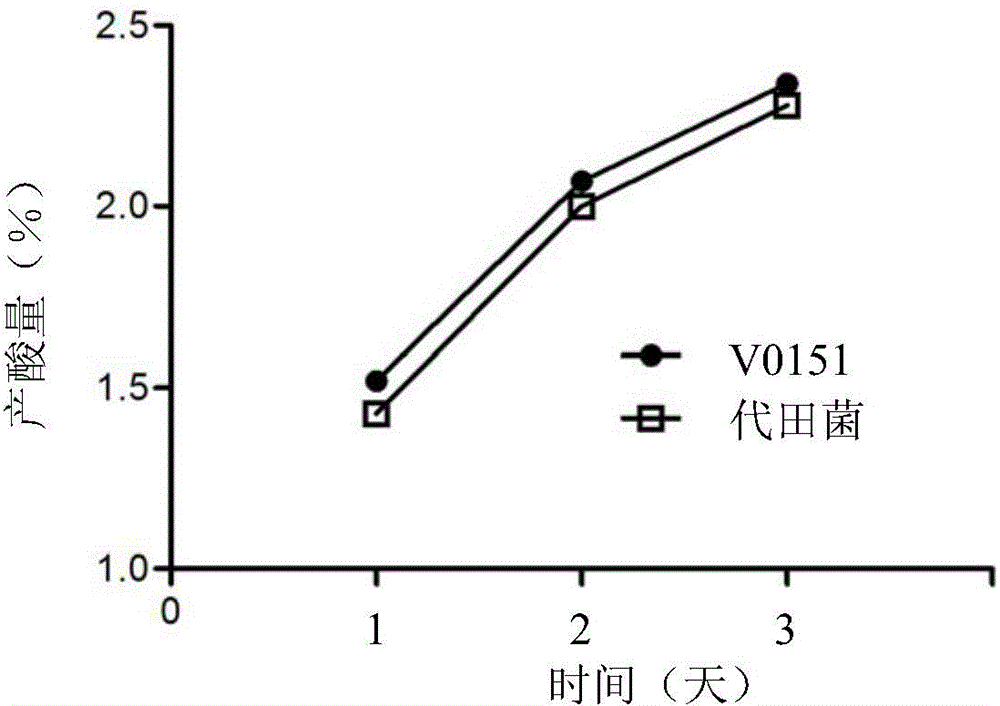Lactobacillus paracasei strain and application thereof
A paracheese and lactobacillus technology, applied in the field of microorganisms, can solve the problems of variable and unpredictable effects of lactobacillus, and achieve the effects of inhibiting allergy and inflammation, excellent acid-producing ability, and regulating immune response.
- Summary
- Abstract
- Description
- Claims
- Application Information
AI Technical Summary
Problems solved by technology
Method used
Image
Examples
Embodiment 1
[0042] Example 1: Identification of 16s rDNA and pheS sequences
[0043] V0151 was isolated from the feces of children in Taiwan, cultured with MRS and cultured at 37°C for one day, then its genomic DNA was extracted, and the genomic DNA was subjected to polymerase chain reaction (Polymerase Chain Reaction) using 16s rDNA and pheS primers (as shown in Table 1). , PCR) to propagate specific DNA sequences, and use the National Center for Biotechnology Information (NCBI) database for strain comparison, the results are shown in Table 2 and Table 3.
[0044] Table 1, 16s rDNA and pheS primer sequences
[0045]
[0046] Table 2 is the result of sequence alignment using 16S rDNA primers for propagation. The 16S rDNA sequence of V0151 is the same as that of the other two strains of Lactobacillus paracasei subsp. The strains have some sequence differences. Therefore, isolate V0151 can be confirmed as Lactobacillus paracasei.
[0047] Since the 16S rDNA similarity in Lactobacillus...
Embodiment 2
[0053] Embodiment 2: the fermentability of Lactobacillus paracasei subspecies V0151
[0054] The fermentability of Lactobacillus paracasei subspecies V0151 on various carbohydrate substrates was tested by API 50CHL rapid identification kit (bioMerieux, France). The results are shown in Table 4.
[0055] Table 4, the fermentability of Lactobacillus paracasei subspecies V0151 to different carbohydrate substrates
[0056] Numbering carbohydrate matrix result Numbering carbohydrate matrix result 0 control group - 25 Aesculin Ferric Citrate + 1 glycerin - 26 Salicin + 2 Erythritol - 27 D-cellobiose + 3 D-arabinose - 28 D-maltose + 4 L-arabinose - 29 D-Lactose (sourced from bovine) + 5 D-ribose + 30 D-melibiose - 6 D-xylose - 31 D-sucrose + 7 L-xylose - 32 D-Trehalose + 8 D-Ribitol + 33 Inulin - 9 Methyl-β-D-xylopyranoside - 34 D-Melezitose - 10 D-ga...
Embodiment 3
[0058] Embodiment 3: the acid production capacity of Lactobacillus paracasei subspecies V0151
[0059] Lactobacillus paracasei subsp. V0151 was cultured in the MRS medium, and the bacterial solution was taken out at 24, 36 and 72 hours for spreading and counting. Take out one percent of the volume of the secondary activation bacteria liquid, culture the culture liquid based on skim milk at 37°C for 24 hours, 36 and 72 hours, take out the fermented culture liquid to detect the pH value of the culture liquid and carry out acid titration In the experiment, the Daita bacteria isolated from Yakult was taken as a control.
[0060] In the acid titration test, every 5 grams of fermented culture liquid was mixed with 20 milliliters of pure water, and titrated with 0.1N sodium hydroxide to calculate the acid production of the strain to be tested. The titration end point is defined as between pH 8.30 and 8.32, and the formula for calculating the amount of acid produced by lactic acid ba...
PUM
 Login to View More
Login to View More Abstract
Description
Claims
Application Information
 Login to View More
Login to View More - R&D
- Intellectual Property
- Life Sciences
- Materials
- Tech Scout
- Unparalleled Data Quality
- Higher Quality Content
- 60% Fewer Hallucinations
Browse by: Latest US Patents, China's latest patents, Technical Efficacy Thesaurus, Application Domain, Technology Topic, Popular Technical Reports.
© 2025 PatSnap. All rights reserved.Legal|Privacy policy|Modern Slavery Act Transparency Statement|Sitemap|About US| Contact US: help@patsnap.com



